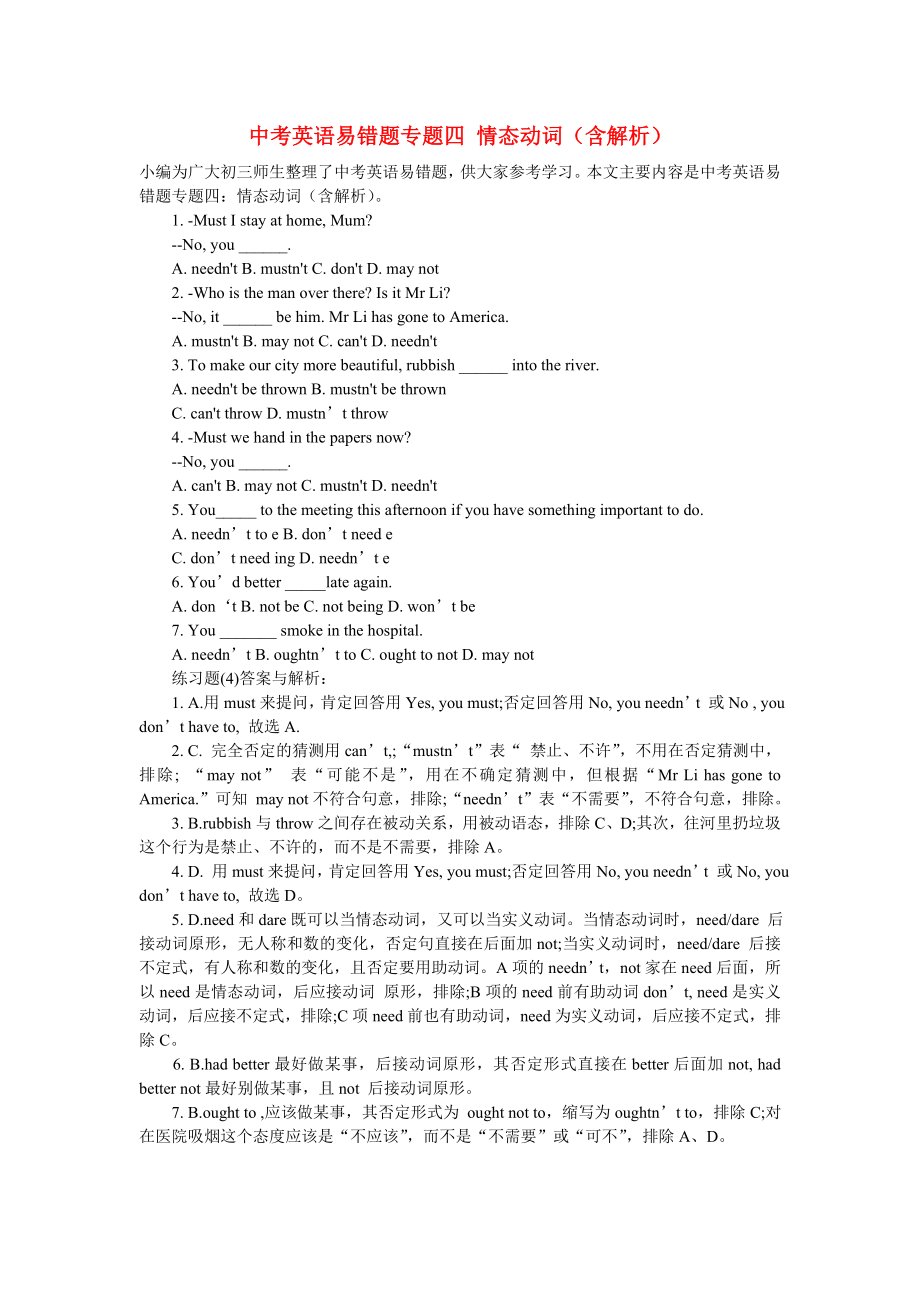《中考英語(yǔ)易錯(cuò)題專(zhuān)題四 情態(tài)動(dòng)詞(含解析)》由會(huì)員分享�����,可在線閱讀,更多相關(guān)《中考英語(yǔ)易錯(cuò)題專(zhuān)題四 情態(tài)動(dòng)詞(含解析)(1頁(yè)珍藏版)》請(qǐng)?jiān)谘b配圖網(wǎng)上搜索���。
1�����、中考英語(yǔ)易錯(cuò)題專(zhuān)題四 情態(tài)動(dòng)詞(含解析)
小編為廣大初三師生整理了中考英語(yǔ)易錯(cuò)題�,供大家參考學(xué)習(xí)�����。本文主要內(nèi)容是中考英語(yǔ)易錯(cuò)題專(zhuān)題四:情態(tài)動(dòng)詞(含解析)��。
1. -Must I stay at home, Mum?
--No, you ______.
A. needn't B. mustn't C. don't D. may not
2. -Who is the man over there? Is it Mr Li?
--No, it ______ be him. Mr Li has gone to America.
A. mustn't B. may
2�����、not C. can't D. needn't
3. To make our city more beautiful, rubbish ______ into the river.
A. needn't be thrown B. mustn't be thrown
C. can't throw D. mustn’t throw
4. -Must we hand in the papers now?
--No, you ______.
A. can't B. may not C. mustn't D. needn't
5. You_____ to the
3�、 meeting this afternoon if you have something important to do.
A. needn’t to e B. don’t need e
C. don’t need ing D. needn’t e
6. You’d better _____late again.
A. don‘t B. not be C. not being D. won’t be
7. You _______ smoke in the hospital.
A. needn’t B. oughtn’t to C. ought to not
4、 D. may not
練習(xí)題(4)答案與解析:
1. A.用must來(lái)提問(wèn)�����,肯定回答用Yes, you must;否定回答用No, you needn’t 或No , you don’t have to, 故選A.
2. C. 完全否定的猜測(cè)用can’t,;“mustn’t”表“ 禁止、不許”�����,不用在否定猜測(cè)中�����,排除; “may not” 表“可能不是”���,用在不確定猜測(cè)中,但根據(jù)“Mr Li has gone to America.”可知 may not不符合句意���,排除;“needn’t”表“不需要”����,不符合句意����,排除。
3. B.rubbish與throw之間存在被
5�����、動(dòng)關(guān)系,用被動(dòng)語(yǔ)態(tài)���,排除C���、D;其次,往河里扔垃圾這個(gè)行為是禁止����、不許的,而不是不需要��,排除A���。
4. D. 用must來(lái)提問(wèn)����,肯定回答用Yes, you must;否定回答用No, you needn’t 或No, you don’t have to, 故選D�����。
5. D.need和dare既可以當(dāng)情態(tài)動(dòng)詞���,又可以當(dāng)實(shí)義動(dòng)詞����。當(dāng)情態(tài)動(dòng)詞時(shí),need/dare 后接動(dòng)詞原形��,無(wú)人稱(chēng)和數(shù)的變化�����,否定句直接在后面加not;當(dāng)實(shí)義動(dòng)詞時(shí)����,need/dare 后接不定式���,有人稱(chēng)和數(shù)的變化����,且否定要用助動(dòng)詞�。A項(xiàng)的needn’t,not家在need后面���,所以need是情態(tài)動(dòng)詞��,后應(yīng)接動(dòng)詞 原形�,排除;B項(xiàng)的need前有助動(dòng)詞don’t, need是實(shí)義動(dòng)詞,后應(yīng)接不定式��,排除;C項(xiàng)need前也有助動(dòng)詞�����,need為實(shí)義動(dòng)詞�����,后應(yīng)接不定式�����,排除C���。
6. B.had better最好做某事�����,后接動(dòng)詞原形��,其否定形式直接在better后面加not, had better not最好別做某事��,且not 后接動(dòng)詞原形���。
7. B.ought to ,應(yīng)該做某事�,其否定形式為 ought not to�,縮寫(xiě)為oughtn’t to,排除C;對(duì)在醫(yī)院吸煙這個(gè)態(tài)度應(yīng)該是“不應(yīng)該”�����,而不是“不需要”或“可不”����,排除A、D����。
 中考英語(yǔ)易錯(cuò)題專(zhuān)題四 情態(tài)動(dòng)詞(含解析)
中考英語(yǔ)易錯(cuò)題專(zhuān)題四 情態(tài)動(dòng)詞(含解析)
